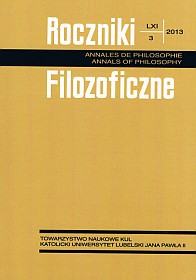Logika teologii objawionej w pismach Alberta Wielkiego i Tomasza z Akwinu
Abstrakt
In this paper the Author presents some remarks and hypotheses concerning the logic of revealed theology according to approach of Saint Albert the Great anf Saint Thomas Aquinas. First of all he shows that in their opinion revealed theology uses logic (as a science of correct reasonings). He also discusses the problem of scientific status of revealed theology on the grounds of the most important methodological fragments from their summas of theology; in this light he analyses if the revealed theology in their view may be interpreted as a kind of axiomatic deductive system. The Author inclines to give a positive answer on this question and presents a couple of arguments for such a hypothesis, however he is aware that the point is not totally clear and—hence—open for discussion. The next topic is a question if we can admit that Thomas adopts one of non-monotonic logic (understood here as relation of inference or relation of consequence) in some reasonings which we find in his Summa Theologiae. The Author gives a positive answer and confronts his opinion with an opinion of his opponent. In the third set of remarks he wonders if we may adopt that Aquinas accepts some local modifications in logic (this time understood as a some general rules of thinking), such as “the logic of Trinity” or “the Christologic”. Finally the Author invokes a case of the logic of negative theology and a nature of negation adopted according to this approach. However these remarks presented in this article concern the works of Albert and Thomas, the Author tends to affirm that their approach to the Catholic revealed theology is a proper one and—in this light—these conclusions may be valid for contemporary theology.
Bibliografia
Albert Wielki: Summa Theologiae, [w:] Alberti Magni Opera Omnia, t. 34, cz. 1, ed. D. Siedler et. al., Münster 1978.
Arystoteles: Analityki wtóre, tł. K. Leśniak, [w:] tenże, Dzieła wszystkie, t. 1, Warszawa 2003.
Bartoś T.: Koniec prawdy absolutnej. Tomasz z Akwinu w epoce późnej nowoczesności, Warszawa 2010.
Bocheński J.M.: Współczesne metody myślenia, tł. S. Judycki, Poznań 1988.
Humbrecht Th.-D.: Teologia negatywna św. Tomasza z Akwinu, tł. A. Kuryś, [w:] Święty Tomasz teolog. Wybór studiów, Warszawa–Kęty 2005, s. 136-209.
Majewski J.: Ogólnoteologiczny kontekst dogmatyki, [w:] E. Adamiak, E. Czaja, J. Ma–jewski (red.), Dogmatyka, t. 1, Warszawa 2005.
Makinson D.: Od logiki klasycznej do niemonotonicznej, tł. T. Jarmużek, Toruń 2008.
Malinowski J.: Logiki niemonotoniczne, „Przegląd Filozoficzny” 1997, nr 1(21), s. 7 i 8.
Mikołaj z Amiens: Ars fidei catholicae, [w:] Nikolaus von Amiens, Ars fidei catholicae – ein Beispielwerk axiomatischer Methode, ed. M. Dreyer, Münster 1993, s. 76-103.
Olszewski M.: Teologia jako nauka według Tomasza z Akwinu jak też o pożytkach płynących z czytania średniowiecznych tomistów, [w:] B. Kochaniewicz (red.), Teologia św. Tomasza z Akwinu dzisiaj, Poznań 2010, s. 137-150, i cytowana tam literatura.
Pogoda P.: Tomasz z Akwinu monotonicznie, „Filozofia Nauki” 2012, nr 2, s. 129-133.
Tomasz z Akwinu: De ente et essentia, ed. L. Baur, Monasterii Westfalorum 1933.
Tomasz z Akwinu: Traktat o Bogu, Kraków 1999.
Tomasz z Akwinu: Summa Theologiae, Textum Leoninum, Roma 1888.
Torrell J-P.: Święty Tomasz z Akwinu, mistrz duchowy, tł. A. Kuryś, Poznań–Warszawa 2003.
Trepczyński M.: Tomasz z Akwinu niemonotonicznie, „Filozofia Nauki” 2011, nr 2, s. 115-121.
Copyright (c) 2013 Roczniki Filozoficzne

Utwór dostępny jest na licencji Creative Commons Uznanie autorstwa – Użycie niekomercyjne – Bez utworów zależnych 4.0 Międzynarodowe.





